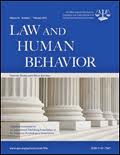Information regarding intelligence may be used to predict an individual’s Miranda abilities and emphasized concerns that people with intellectual disability are at a significant risk to make uninformed waivers of their rights. This is the bottom line of a recently published article in Law and Human Behavior. Below is a summary of the research and findings as well as a translation of this research into practice.

Featured Article | Law and Human Behavior | 2020, Vol. 44, No. 1, 60-70
The Predictive Power of Intelligence: Miranda Abilities of Individuals With Intellectual Disability
Authors
Sydnee L. Erickson, University of Alabama
Karen L. Salekin, University of Alabama
Lauren N. Johnson, University of Alabama
Stephanie C. Doran, University of Alabama
Abstract
Objective: The Miranda v. Arizona (1966) decision was intended to protect individuals’ rights in custodial situations. The purpose of this article was to evaluate Miranda abilities of individuals with intellectual disability and evaluate the utility of intelligence in predicting these abilities. Additionally, we aimed to provide an updated resource for forensic examiners regarding the performance of individuals with intellectual disability on the Standardized Assessment of Miranda Abilities (SAMA). Hypotheses: We hypothesized that IQ, particularly verbal intelligence and working memory, would significantly predict abilities related to recall, vocabulary, knowledge, and acquiescence in a sample with intellectual disability. Method: Sixty-two individuals diagnosed with intellectual disability completed the Wechsler Adult Intelligence Scale– 4th ed. (WAIS-IV), the SAMA, and a background questionnaire. Results: Participants demonstrated significantly worse Miranda abilities when compared to the normative sample of the SAMA apart from acquiescence, which they demonstrated at significantly higher rates. Participants exhibited limited existing knowledge of Miranda rights and showed minimal improvement following exposure to a Miranda warning. Verbal abilities were a significant predictor of recall and vocabulary abilities with large effect sizes on average (i.e., ds > 1). IQ was not predictive of misconceptions about Miranda or acquiescence. Conclusions: Verbal intelligence was an important contributor to understanding Miranda. This study provided data related to performance on the SAMA by a sample of individuals with intellectual disability. It may serve as a reference for evaluators, legal professionals, and law enforcement officers when working with justice-involved persons with suspected intellectual disability.
Keywords
Miranda rights, intellectual disability, Standard Assessment of Miranda Abilities, intelligence, Miranda comprehension
Summary of the Research
“In 1966, the Supreme Court of the United States made a land- mark decision regarding constitutional rights in custodial situations. In the case of Miranda v. Arizona (1966), the Justices ruled that safeguards must be put in place to ‘secure the privilege against self-incrimination’ (p. 444) and to provide the individual with access to an attorney to protect Sixth Amendment rights. The Miranda decision mandated that individuals in custodial settings must be informed of these protections, rather than relying on the assumption that individuals would preemptively know their rights. As per Miranda, defendants must be provided the following information, which may vary in wording by jurisdiction:
1. You have the right to remain silent.
2. Anything you say can and will be used against you.
3. You have the right to an attorney.
4. If you cannot afford an attorney, one will be appointed to you.
5. You can assert these rights at any time” (p. 60).
“The Miranda rights are afforded to all persons and can be waived by an individual provided that the waiver is made in a knowing, voluntary, and intelligent manner. However, the Miranda decision did not specify a standardized procedure for determining the validity of a waiver. Instead, decisions regarding the acceptableness of a waiver are often left to the discretion of law enforcement officers presiding over the custodial situation. Existing studies regarding the comprehension of police warnings have repeatedly demonstrated that various members of the general adult population have difficulties understanding these constitutional rights. A paucity of understanding can lead to individuals executing uninformed decisions regarding their Miranda rights” (p. 61)
“Due to the popularity of crime-related media (e.g., TV, cinema, podcasts, etc.), people in the United States have increased exposure to the Miranda warning as portrayed by these outlets. Rogers (2008) noted this prevalence of partial exposure can lead to an inaccurate understanding of Miranda rights and cause misplaced confidence in one’s own understanding of these rights. Prior studies demonstrated that despite an increased prevalence of Miranda in the media, people still exhibit difficulties with recalling the Miranda rights” (p. 61).
“Beyond struggles with recall, existing research elucidates the problematic language of the Miranda warning. One such factor is that a 10th grade reading level, or higher, has been shown to be necessary to understand over 60 words commonly found in Miranda warnings” (p. 61).
“Apart from possible difficulties with the advanced reading levels, the general population does not understand the rights that are protected by the Miranda warnings. In both community samples (e.g., jury pools and college students) and samples of pretrial defendants, Rogers and colleagues, found that many participants did not know the right to remain silent was a protection afforded by the Constitution. The participants also reported that they believed remaining silent would have negative repercussions because it would appear as a portrayal of guilt. Approximately one third to over one half of both samples incorrectly assumed that statements could be made off the record and would not be used as evidence against them” (p. 61).
“In addition to misconceptions regarding the protections of Miranda, individuals evidence a lack of understanding of the consequences related to waiving Miranda” (p. 61).
“Intellectual disability is a neurodevelopmental disorder defined as the presence of intellectual deficits and adaptive behavior deficits, which manifest during the developmental period. Individuals with intellectual disability consistently demonstrate significantly lower abilities in various cognitive skills, such as working memory and vocabulary retention, when compared to typically developed (TD) peers. As tasks require increasing levels of control of active processing, differences in working memory performance between individuals with intellectual disability and TD individuals become more pronounced. Deficits in working memory are problematic as working memory is necessary for utilizing prior social knowledge to consider current interactions and make choices. Individuals with intellectual disability are likely to experience difficulty remembering relevant knowledge and making informed decisions when interacting with police officers” (p. 62).
“Few studies to date have examined the level of knowledge of Miranda in individuals with intellectual disability and have not exclusively utilized the Standard Assessment of Miranda Abilities in a sample of individuals diagnosed with intellectual disability. Due to differences in functioning and capabilities, it cannot be assumed that research conducted with individuals without intellectual disability is applicable or representative of individuals with intellectual disability. It is likely that deficits identified in these samples would be magnified when evaluating individuals with intellectual disability. The purpose of this study was twofold, (a) to determine levels of recall, vocabulary comprehension, misconceptions, and acquiescence relevant to Miranda rights in a sample of individuals with intellectual disability, and (b) to determine the ability of IQ, and its components, to predict Miranda abilities. We investigated the predictive utility of IQ related to interrogation rights to provide forensic evaluators with a resource that could be used to estimate an individual’s level of Miranda comprehension based on available intelligence scores” (p. 63).
“The current results indicated that verbal ability is the strongest predictor of Miranda recall and vocabulary knowledge of individuals with intellectual disability as measured by the SAMA. Contrary to what we expected, working memory did not demonstrate a significant relationship with Miranda abilities. These findings contribute to the growing body of knowledge about the impact of intellectual ability on psycholegal functioning and elucidate numerous considerations for assessing individuals with intellectual disability who interact with the legal system. Perhaps the most important finding from the current study is that individuals with intellectual disability display remarkably low abilities relevant to comprehending Miranda rights. This suggests that this population is at significant risk to execute Miranda waivers without the prerequisite proficiency to do so in a knowing, voluntary, and intelligent manner” (p. 66-67).
Translating Research into Practice
“Overall, the current study demonstrated that individuals with intellectual disability perform poorly on measures of Miranda knowledge and are significantly disadvantaged in the legal system. These individuals’ cognitive limitations, coupled with high Miranda waiver rates among justice-involved individuals, may cause individuals with intellectual disability to become involved in a system that is incapable of safeguarding their rights. Additionally, it further strengthens the emphasis on the need for competency evaluations regarding Miranda waivers for individuals suspected of presenting with intellectual disability. The utility of intelligence in predicting Miranda abilities may be a useful reference for forensic evaluators or legal professionals in determining a defendant’s probable level of comprehension. Evidence of impaired verbal abilities may be indicative of impaired Miranda understanding and reasoning” (p. 69).
Other Interesting Tidbits for Researchers and Clinicians
“The findings of this study point to the need for future research devoted to improving comprehension of Miranda rights for individuals with intellectual disability. Training programs could be developed for individuals with intellectual disability to prepare them for potential interactions in custodial situations. Information from this study may be used to inform and train law enforcement regarding the characteristics associated with intellectual disability, and how best to interact with these individuals to ensure the necessary safeguards of Miranda remain in place. Although the identification of individuals with intellectual disability is time-consuming and requires expertise, it may be possible to develop a checklist from which officers can determine if the individual might require special consideration when undergoing the arrest process. Modifications such as simplified language, decreased speed of the administration of the warning, and open-ended clarifying questions may be useful when interacting with individuals with cognitive limitations. These adjustments may prove fruitful in ensuring the individual understands their rights, how to invoke their rights, and that any waivers are carried out in a knowing, voluntary, and intelligent manner” (p. 69).
Join the Discussion
As always, please join the discussion below if you have thoughts or comments to add!






















